Retail Business EV Chargers to Supercharge the Buying Experience
Electric vehicle (EV) owners represent a growing consumer market you should be tapping into. Why? More people are turning to EVs as their preferred mode of transportation. In fact, more than half of all passenger cars sold in the U.S. will be electric by 2030. All retail businesses, including convenience stores, or C-stores, are in the perfect position to capitalize on this trend by installing EV fast charging stations at their retail locations.
Retail businesses can attract EV owners actively looking for a DC fast charger as a daily or occasional power source. Sure, EV owners could charge their vehicles at home. But that process takes hours. When they’re out on the road, these drivers prefer DC fast chargers that can help them power up in a matter of minutes.
Added bonus – installing EV chargers for your business are known to increase a C-store’s retail business. About 80% of EV owners go shopping while charging at public stations. On average, these drivers will spend 15-30 minutes at while waiting for their EV to charge.
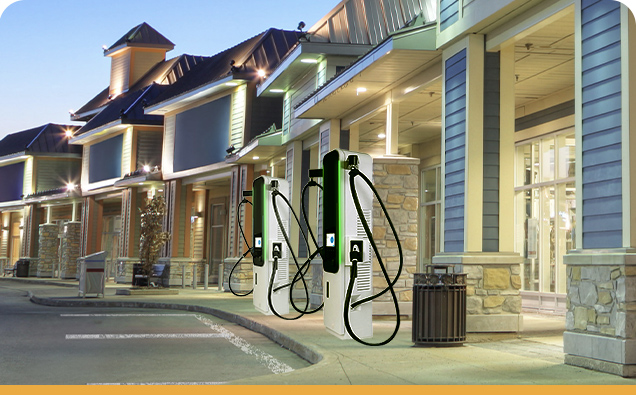

Benefits of installing business EV charging stations at retail locations:
- Expand your business to a new market
- Get a jump on required electrical infrastructure
- Start creating customer loyalty
- Minimum 15 minute charging time for in-store shopping
- Today’s have the ability to increase powering range to future-proof
- Available government funding
- Stand-out from the competition
- Gain new customers by appearing on EV locator apps
- Achieve your business’s sustainability pledge
Challenges: Infrastructure, pump placement, and financing
The growth in the EV market is no secret. Make sure you get ahead of your competitors by preparing your infrastructure for EV fast charging stations. As battery technologies evolve, selecting a fast charging system that’s designed to handle changes can help avoid a costly infrastructure replacement in the future. Don’t become the C-store that installed the charger that everyone drives by because it’s outdated!
Before making a DC EV charger purchase for your business, consider pump placement, power support, charging speeds, and convenient payment options. These factors are proven to contribute to customer satisfaction and repeat business.
In addition, plan how your retail location is going to finance EV fast charging stations, including the purchase and installation cost and ongoing maintenance and support. The good news is there are available federal funds to help support this investment. Read our blog to learn more about funding programs and how to overcome the challenges listed above.
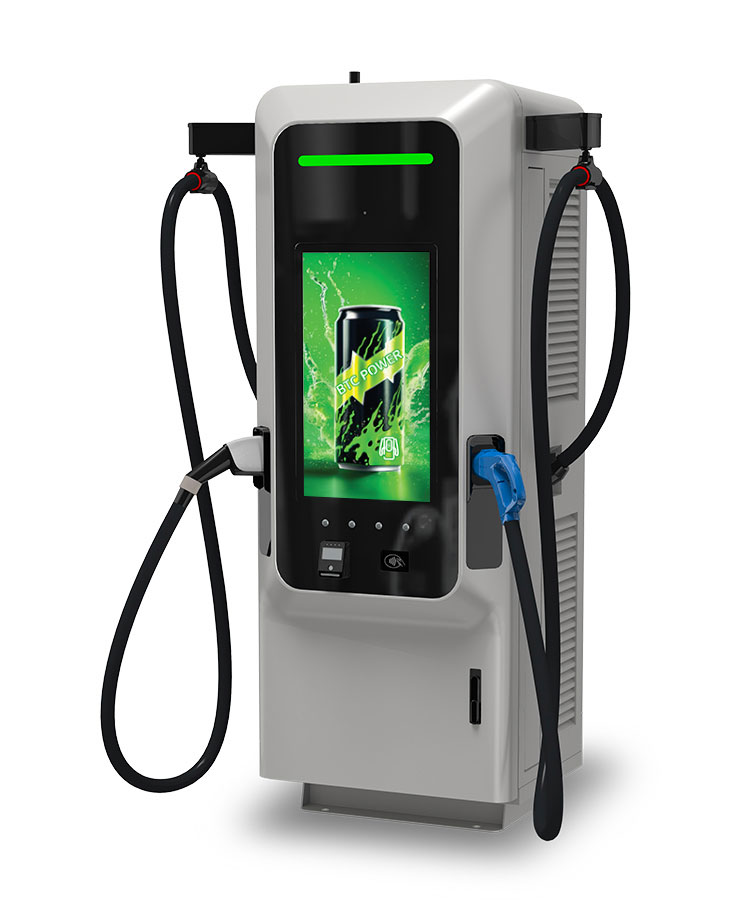
Solutions: Fast, dependable EV charging and dedicated support
EV owners want fast, dependable DC chargers so they can get back on the road as soon as possible. We’ve got the products and services to help you deliver, driving your profits in the right direction.
DC EV chargers
Consider the following DC fast chargers from BTC Power:
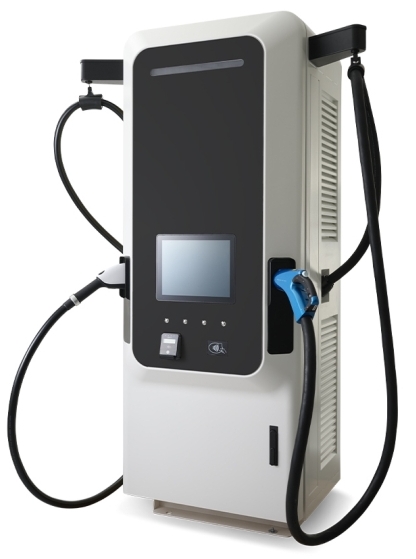
180 kW All-in-One
- 180 kW All-in-One DC fast charger can charge electric vehicles in as little as 10-15 minutes, leading to faster turnover and satisfied customers who quickly become repeat customers. The All-in-One charger:
- Features connector options that support a broad range of EVs
- Has a unique simultaneous charging option that allows more than one user to charge at the same time
- Features touch screen options for credit card or RFID payments
- Includes integrated retractable cables that help minimize cable wear, improving the customer experience
- Occupies the same or similar space of a standard gas pump
- Offers a lower overall cost of ownership compared with other DC EV chargers on the market
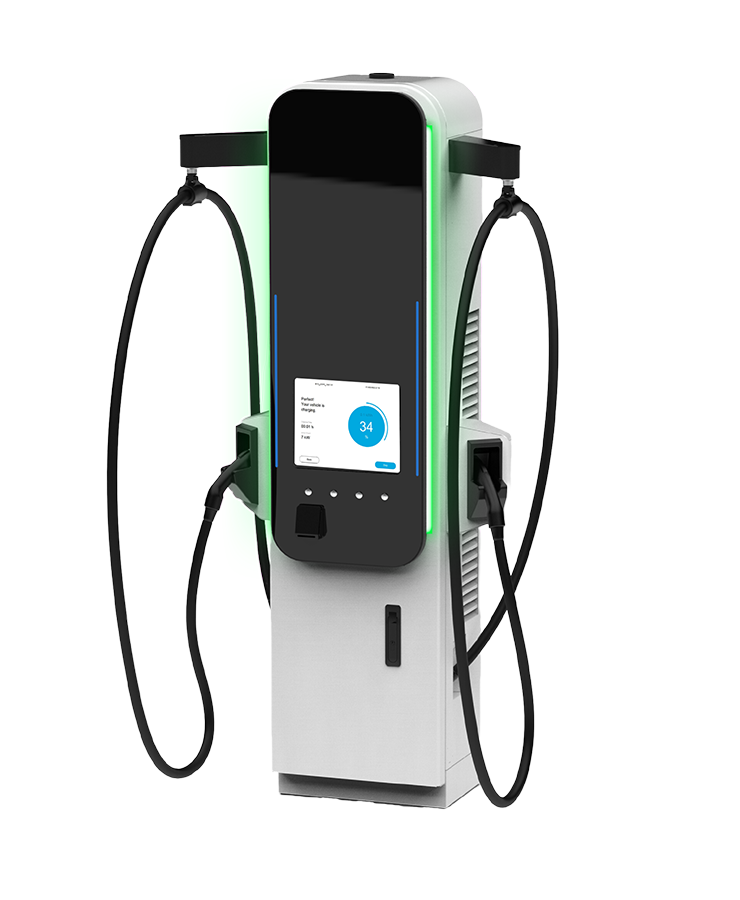
Gen 4 500 Amp Dispenser
- Gen 4 500 Amp Dispenser can charge up to two vehicles simultaneously 1 dispenser, which provides the perfect setup for retail parking lots. This system can interface into every central system, which supports the Open Charge Point Protocol. Plus, this DC fast charger offers multiple configurations. Use with Gen 4 360 kW Power Cabinet to get the perfect commercial EV charging station for your location.
- Dynamic Power Allocation for multiple output simultaneously
- Modular and flexible design
- Intuitive user interface
- Features touch screen options for credit card or RFID payments

Dedicated EV Charger support and training
In addition to providing reliable commercial EV chargers, BTC Power offers dedicated hardware and technical support. Our engineers are available to offer recommendations for retail property infrastructure updates to optimize EV charging and maximize space utilization. Our customer support representatives are ready to answer any questions you may have.
Training for your own company technicians is available. BTC Power will train your company’s technicians on proper maintenance and troubleshooting for our EV fast charging stations.
Fueling the future with EV Chargers for Business
Now is the time to capitalize on the shift toward electric mobility. To date, at least seven states in the U.S. have declared that they will ban the sale of new gas-powered cars by 2035. Of course, this conversion could happen even earlier. According to McKinsey & Company, the EV-charging value pool is expected to rise to $20 billion by 2030. This represents a unique opportunity for you to get ahead of the crowd and capture this growing consumer audience.
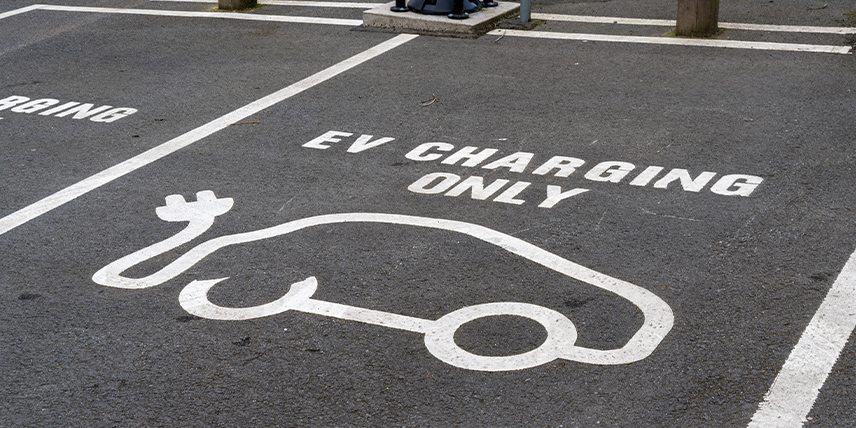
Frequently Asked Questions
The cost of a new EV charger for a retail outlet varies widely depending on the charging speed and installation requirements. And there is no single answer for the cost of the charging equipment. Additional costs include installation, with fees varying depending on site conditions. Retailers should also factor in potential utility upgrades and ongoing maintenance. Government incentives such as the National Electric Vehicle Infrastructure (NEVI) Program may offset some expenses.
EV charging station profitability depends on various factors, including utilization rates, electricity costs, pricing strategies and location. Profitability is highly location-dependent and might take time to reach a profitable level for the charging unit itself. However, retail locations can realize additional revenue from in-store sales due to increased foot traffic and the increased charging time for an EV compared to gasoline refueling. The additional spare time can spur incremental purchases at the charging location’s retail outlet or nearby businesses.
Profit margins on EV chargers can vary widely depending on several factors, including location, usage and cost. Specific figures are difficult to pinpoint. However, industry experts suggest margins can range from 15-35% for well-utilized stations. One key to profitability is the number of charging sessions, or percentage utilization.
NREL stated in one report that DC fast chargers need 6-8 daily charging events for profitability. A recent McKinsey study looked at the intersection of utilization with the price charged per kW-hour, pinpointing a sweet spot of 20% utilization. In one recent roundtable of convenience store owners, the discussion revealed that in the business’ busiest location, the company sees up to 40 charges per day. This highlights the variability in usage and potential profitability. As an additional profit center, retail outlets can look to potential foot traffic from the vehicle owners using charging stations and the additional sales this could generate.
Retail owners and outlets can invest in EV chargers to help attract new customers, offer services to the public that are increasingly adopting electric vehicles, build a reputation for sustainability, and increase potential foot traffic into retail locations. EV charging requires more time than gas refueling, leading most retailers to invest in Level 3 DC fast charging chargers for the quickest turnover and to optimize customer satisfaction.
Before investing in EV charging stations, consider factors like location, customer base and available space. Strategic investment in EV charging can position a business for future growth. And keep in mind that government incentives may help offset initial costs.
Businesses should install EV chargers to attract new customers or potentially increase retail item sales from consumers charging their vehicles. Even with a Level 3 (DC fast) charger, the dwell time for EV charging is significantly longer than refueling with gasoline. While filling a gas tank typically takes 3-5 minutes, charging an EV with a fast charger usually takes 20-40 minutes to reach 80% capacity. This extended period gives retailers more opportunity to engage customers.
Businesses can build a reputation for sustainability and environmental commitment. Chargers may also increase property value and provide potential tax benefits. An EV charging installation can help differentiate your business from competitors. And as EV adoption grows, offering charging can future-proof a retail outlet.
